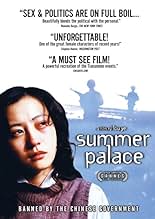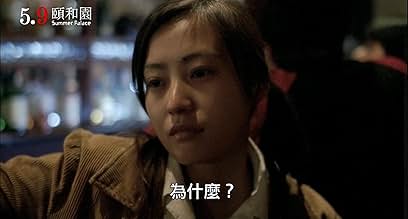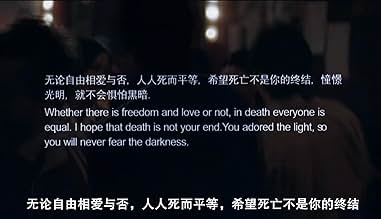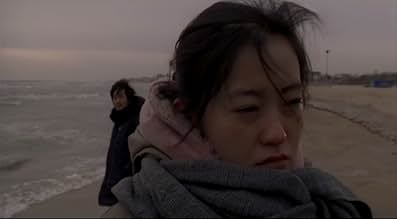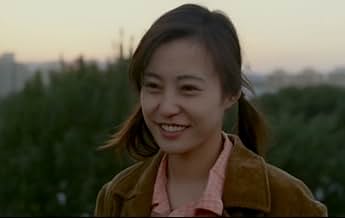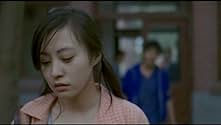IMDb RATING
7.2/10
4.9K
YOUR RATING
Yu Hong leaves her home village and starts university in Beijing, where she develops a consuming and compulsive relationship with another student. The student riots from 1989 then ensue and ... Read allYu Hong leaves her home village and starts university in Beijing, where she develops a consuming and compulsive relationship with another student. The student riots from 1989 then ensue and take a toll on their lives.Yu Hong leaves her home village and starts university in Beijing, where she develops a consuming and compulsive relationship with another student. The student riots from 1989 then ensue and take a toll on their lives.
- Awards
- 1 nomination total
- Director
- Writers
- All cast & crew
- Production, box office & more at IMDbPro
Featured reviews
This Cannes Festival 2006 entry by the director of Suzhou River and Purple Butterfly (enjoyng very limited US theatrical release in early 2008) is more unwieldy but also bolder and more authentic than its predecessors, while still as moony and emotional and indebted to Wong Kar-wai and the French New Wave. You could compare this to Dr. Zhivago or Splendor in the Grass but despite its intense period flavor at times--the cluttered dorm rooms stay with you as do the rushing demonstrators, and the progression from bikes to nice cars and email is subtle but unmistakable--it hasn't got the structure or plot of the usual generation-spanning films; it's a hymn to love-longing posing as a contemporary historical epic. As such, it's poised for failure and doomed to be dismissed by many. But it's really great fun, a fluent, flowing, committed film with more to think about and respond to than much better-made and more tightly-edited work. And after it was shown at Cannes without official permission from home, it got Lou banned from film-making in China for five years.
Full of intense realistic sex and frontal nudity that would be daring anywhere not to mention China , Summer Palace focuses on a passionate young woman who comes from the country to study at Beijing University just before the Tiananmen Square demonstrations and massacre of 1988, and though it brilliantly evokes the excitement, freedom, and experimentation of that period for what is essentially the director's own generation (Purple Butterfly dealt with the 1930's), and it gives a sense of the chaos and horror that follows--this extended, breathtaking Tiananmen-period sequence is a tour de force--the politics are peripheral to protagonist Yu Hong (Hao Lei) and the intense love addiction she shares with Zhu Wei (Guo Xiaodong). But when the repression comes, Xiao Jun (Cui Lin), Yu Hong's high school boyfriend, with whom she had intense sex at the film's outset, comes to rescue her and take her back to Tumen, in the country. The turbulent give and take of man-woman relationships is as intense at times as anything in D.H. Lawrence, but with a sexual explicitness Lawrence achieved only in Lady Chatterley.
As played by the striking and talented Hao Lei, Yu Hong is a hell of a young woman, beautiful, alive, articulate, philosophical--her diary provides voice-over for many of the film's scenes--willful, and never satisfied with Zhou Wei, but never able till the end (fourteen years later) to let him go either. She doesn't want him, she says, but when she is with him she is happy. Any critique of the movie has to recognize that this is what it's about.
It's quite true that (once again) rain is used excessively, but like many a filmmaker before him Lou Ye recognizes that rain, cigarettes, alcohol and intense sex by good looking people are enough to make a movie atmospheric and sexy and compulsively watchable. Jaunty Chinese pop songs and bursts of passionate classical strings are used with a broad hand, but they always work in context.
Summer Palace is too long, and its wild abandon catches up with it in the diffuse, occasionally irrelevant sequences of the second half. When the political repression comes and Wei goes to Berlin along with Hong's best girlfriend Li Ti (Hu Lingling) and her boyfriend Ryi Gu (Zhang Ziannin), and there are details of the fall of the Berlin Wall and Perestroika that have far less urgency, the whole mood dissipates and the focus meanders. Hong, who's already caught Li Ti with the love of her life Zhou Wei, drifts or rather plunges greedily from one man to another. There's an abortion, a bike accident, adultery, a suicide, and other events, including a bittersweet reunion, but these are just blips in the long meditation on love-longing and life.
Shown at Cinema Village in New York City January-February 2008.
Full of intense realistic sex and frontal nudity that would be daring anywhere not to mention China , Summer Palace focuses on a passionate young woman who comes from the country to study at Beijing University just before the Tiananmen Square demonstrations and massacre of 1988, and though it brilliantly evokes the excitement, freedom, and experimentation of that period for what is essentially the director's own generation (Purple Butterfly dealt with the 1930's), and it gives a sense of the chaos and horror that follows--this extended, breathtaking Tiananmen-period sequence is a tour de force--the politics are peripheral to protagonist Yu Hong (Hao Lei) and the intense love addiction she shares with Zhu Wei (Guo Xiaodong). But when the repression comes, Xiao Jun (Cui Lin), Yu Hong's high school boyfriend, with whom she had intense sex at the film's outset, comes to rescue her and take her back to Tumen, in the country. The turbulent give and take of man-woman relationships is as intense at times as anything in D.H. Lawrence, but with a sexual explicitness Lawrence achieved only in Lady Chatterley.
As played by the striking and talented Hao Lei, Yu Hong is a hell of a young woman, beautiful, alive, articulate, philosophical--her diary provides voice-over for many of the film's scenes--willful, and never satisfied with Zhou Wei, but never able till the end (fourteen years later) to let him go either. She doesn't want him, she says, but when she is with him she is happy. Any critique of the movie has to recognize that this is what it's about.
It's quite true that (once again) rain is used excessively, but like many a filmmaker before him Lou Ye recognizes that rain, cigarettes, alcohol and intense sex by good looking people are enough to make a movie atmospheric and sexy and compulsively watchable. Jaunty Chinese pop songs and bursts of passionate classical strings are used with a broad hand, but they always work in context.
Summer Palace is too long, and its wild abandon catches up with it in the diffuse, occasionally irrelevant sequences of the second half. When the political repression comes and Wei goes to Berlin along with Hong's best girlfriend Li Ti (Hu Lingling) and her boyfriend Ryi Gu (Zhang Ziannin), and there are details of the fall of the Berlin Wall and Perestroika that have far less urgency, the whole mood dissipates and the focus meanders. Hong, who's already caught Li Ti with the love of her life Zhou Wei, drifts or rather plunges greedily from one man to another. There's an abortion, a bike accident, adultery, a suicide, and other events, including a bittersweet reunion, but these are just blips in the long meditation on love-longing and life.
Shown at Cinema Village in New York City January-February 2008.
Lou Ye's "Summer Palace" ("Yihe yuan") has plenty of frontal nudity and a fair number of (not very attractive) sex scenes, but that's not why the movie was banned by Beijing, and Ye forbidden to work in the film industry for five years.
More likely, official displeasure was incurred by the film's powerful recreation of the Tiananmen events of 1989, from the students' point of view - and, coincidentally, equaling Tolstoy's representation of the chaos of war in the Borodino scenes of "War and Peace." And yet, all that is besides the point.
Rather, after tonight's screening of "Summer Palace" in the Castro, at the 25th annual San Francisco International Asian American Film Festival, your bewildered and overwhelmed reporter is positing this central question: whither Lou Ye? After those five years (or making movies elsewhere) will Ye become the new Zhang Yimou and China's best or just an imitator of the loathsome Tsai Ming-liang, teasing and torturing the audience... just because he can?
My money - and hope - is on the better scenario. However strange and convoluted and bizarre and frustrating "Summer Palace" may be, it appears "sincere" and not reaching for effect. It's a magnificent failure or a miserable masterpiece, a stupid soap opera or a splendid insight into the human condition - the choice is up to you; for me, it was all that, and more. Seen so far only at film festivals (Cannes, Toronto, Mill Valley, Pusan and Oslo), the film is due for release in France next month and not, so far, in the U.S.
Lack of commercial exposure may not be a bad thing. This is a "festival film," if there was ever one, and watching it on DVD may be the next best thing. If it came to theaters in this country, few people would go to see it, and of those, many would leave long before its conclusion 2 hours and 20 minutes later. And yet, and yet...
The script - also by Ye, apparently heavily autobiographical - follows a group of young people from their Beijing University days in the 1980s through the present. The central character is Yu Hong, a teenager from the countryside. As played by Lei Hao - with little of Zhang Ziyi's physical charms and a hundred times her acting ability - here is a cinematic heroine for the ages: a complex, puzzling, neurotic young woman with touching aspirations and scary unpredictability. Lei Hao becomes the character in a naked, unselfconscious, totally believable way - she alone make "Summer Palace" a must-see film (except that you can't).
Ye's way of telling the story is personal, iconoclastic, dragging here, speeding up there, taking us to Berlin (?!), unintentionally nonlinear, showing Yu Hong is similar situations time and again - and yet slowly spinning an intelligent, poetic subtext in the background.
Hard as it may be to imagine, "Summer Palace" has something in common with Alain Resnais' "Last Year in Marienbad," in its wistfulness, lack of specific believability and yet presenting a feeling that makes perfect "sense." There are a hundred things "wrong" with Ye's work and yet it's one of the more memorable films in years.
More likely, official displeasure was incurred by the film's powerful recreation of the Tiananmen events of 1989, from the students' point of view - and, coincidentally, equaling Tolstoy's representation of the chaos of war in the Borodino scenes of "War and Peace." And yet, all that is besides the point.
Rather, after tonight's screening of "Summer Palace" in the Castro, at the 25th annual San Francisco International Asian American Film Festival, your bewildered and overwhelmed reporter is positing this central question: whither Lou Ye? After those five years (or making movies elsewhere) will Ye become the new Zhang Yimou and China's best or just an imitator of the loathsome Tsai Ming-liang, teasing and torturing the audience... just because he can?
My money - and hope - is on the better scenario. However strange and convoluted and bizarre and frustrating "Summer Palace" may be, it appears "sincere" and not reaching for effect. It's a magnificent failure or a miserable masterpiece, a stupid soap opera or a splendid insight into the human condition - the choice is up to you; for me, it was all that, and more. Seen so far only at film festivals (Cannes, Toronto, Mill Valley, Pusan and Oslo), the film is due for release in France next month and not, so far, in the U.S.
Lack of commercial exposure may not be a bad thing. This is a "festival film," if there was ever one, and watching it on DVD may be the next best thing. If it came to theaters in this country, few people would go to see it, and of those, many would leave long before its conclusion 2 hours and 20 minutes later. And yet, and yet...
The script - also by Ye, apparently heavily autobiographical - follows a group of young people from their Beijing University days in the 1980s through the present. The central character is Yu Hong, a teenager from the countryside. As played by Lei Hao - with little of Zhang Ziyi's physical charms and a hundred times her acting ability - here is a cinematic heroine for the ages: a complex, puzzling, neurotic young woman with touching aspirations and scary unpredictability. Lei Hao becomes the character in a naked, unselfconscious, totally believable way - she alone make "Summer Palace" a must-see film (except that you can't).
Ye's way of telling the story is personal, iconoclastic, dragging here, speeding up there, taking us to Berlin (?!), unintentionally nonlinear, showing Yu Hong is similar situations time and again - and yet slowly spinning an intelligent, poetic subtext in the background.
Hard as it may be to imagine, "Summer Palace" has something in common with Alain Resnais' "Last Year in Marienbad," in its wistfulness, lack of specific believability and yet presenting a feeling that makes perfect "sense." There are a hundred things "wrong" with Ye's work and yet it's one of the more memorable films in years.
I thought this film was a fascinating portrait of Chinese youth and culture, as they struggle through some astoundingly turbulent times. Coming into maturity while defining love, commitment, and one's self is a challenging part of any youth's life, but all the more so as part of a society that is struggling through the same challenges itself. I found interesting analogies of the Chinese village in the character of Yu Huong, and the big city in Zhou Wei. Somewhere around college age, we all attempt to define what is important to us and explore what we can do, can be, and want. Some of that experience is sorting through our history - family, village, cultural - and deciding what we want to carry forward and embrace, and what to rebel against and discard, and I believe that this film paints a lovely, if gritty, portrayal of modern China doing just that. In their dorm rooms, in the bars and restaurants, in their homes, in their hearts. On the one hand, I would have, aesthetically, enjoyed a more sumptuous, smooth production; but that is not modern China. China (what admittedly little of it I've seen) is gritty, sweaty, crowded, noisy, straining, and that's what I see in this film.
Whether there is freedom and love or not, in death everyone is equal. I hope that death is not your end. You adored the light, so you will never fear the darkness.
Recently, I had a sudden urge to watch the banned film "The Flowers of War" by director Lou Ye. After watching it, I still couldn't figure out why it was called that, as it has nothing to do with the Summer Palace. During the search for resources, I found both a 134-minute and a 140-minute version, and ultimately chose the latter. My mental journey during the viewing was as follows: What the heck is this? It's all about love and sex. So Lou Ye is into this? He likes to use sex to express the confusion and aimlessness of young people? I always consider myself a down-to-earth person, and I admit that I really couldn't understand what the director was trying to convey. So I will look for other materials to help me understand. I feel that Lou Ye wanted to capture the fate of individuals in the historical tide. I can sense the director's ambition, but it's really hard to understand. Without professional explanations, I admit that I really couldn't get it! Why can't the director just tell a clear story? Not everyone can understand metaphors, of course, that's the charm of art films. It's endlessly intriguing and captivating, making one want to explore further. This is the allure of the unknown, and curiosity drives us to meet. Alright, Lou Ye, you win!
Recently, I had a sudden urge to watch the banned film "The Flowers of War" by director Lou Ye. After watching it, I still couldn't figure out why it was called that, as it has nothing to do with the Summer Palace. During the search for resources, I found both a 134-minute and a 140-minute version, and ultimately chose the latter. My mental journey during the viewing was as follows: What the heck is this? It's all about love and sex. So Lou Ye is into this? He likes to use sex to express the confusion and aimlessness of young people? I always consider myself a down-to-earth person, and I admit that I really couldn't understand what the director was trying to convey. So I will look for other materials to help me understand. I feel that Lou Ye wanted to capture the fate of individuals in the historical tide. I can sense the director's ambition, but it's really hard to understand. Without professional explanations, I admit that I really couldn't get it! Why can't the director just tell a clear story? Not everyone can understand metaphors, of course, that's the charm of art films. It's endlessly intriguing and captivating, making one want to explore further. This is the allure of the unknown, and curiosity drives us to meet. Alright, Lou Ye, you win!
I saw this movie at the 2007 International Film Festival of Rotterdam. The director was present at the screening for a Q&A.
Plot Summary (beginning only): China in the late 1980's. Yu Hong, a 17-year old girl leaves her boyfriend and father to go studying in Beijing. She befriends a girl who stays in a dorm across the hall. They go out dancing with her boyfriend and another friend, Zhou Wei. She soon knows: this is the love of her life.
This is the start of a story about love, mostly from the viewpoint of Yu Hong, the girl. We get insight into her thoughts as she reads from her diary in a voice-over. The love story is set against the student protests on Tiananmen Square. The protests and riots set off a change in the lives of all the main characters. We skip through time and return with them in the late 1990's.
Summer Palace has a lot to say during its 140 minutes. Becoming an adult in the 80's and 90's in China, student life, friendship, sex and most of all love. The language alternates between high-sounding diary thoughts and realistic taken-from-life dialogs. The photography varies from poetic "print it and hang it on the wall" quality to a grittier style, e.g. during the riots.
I really liked how the director fit love making scenes so integral into the movie. In most movies, scenes suddenly stop to ensure a good MPAA-rating. Or the camera pans and zooms unnaturally to keep the 'dirty parts' out of view. Here, director Lou Ye keeps things flowing to simply tell the full story of two people during all stages of their relation. Notice for instance how Yu Hong's love making changes as the story progresses.
This, and other elements such as "defining love" and the background of political turmoil brought back memories of Philip Kaufnan's The Unbearable Lightness of Being, based on Milan Kundera's book. I must admit that TULoB (the 1988 movie) made more impact on me when I first saw it than Summer Palace does now. But this different ranking may also be the result of my cultural background (I am European), age or maturity.
This movie may speak more to the young of heart and the romantics. A bit to my surprise, the few people that I saw leaving the theater prematurely were all 50+. This movie can split audiences, I guess. Some will ravingly love it, but it may leave others unaffected. People who belong to the latter group, will probably also think that the movie is too slow or too long. I base this on comments that I have read and heard at the festival.
I probably want to see this movie again. some time soon. The images and music are worth experiencing another time. Also, at times the pace of events is quite high, so it may help me to capture all of it better.
I rate this movie as one of the highlights of the festival: It's probably also the best movie from China that I have seen in the last two years: 9/10.
Crew Trivia: Cinematographer Qing Hua was a classmate in film school of Yu Wang, the director of photography of Suzhou River (the director's breakthrough film). Qing Hua was recommended by Yu Wang when he was unavailable.
Title Trivia: Summer Palace is the name of one of the buildings at Tiananmen Square. According to the director, the events at the square mark a change in the lives of the main characters.
Connection Trivia: Asked about being influenced or inspired by "The Unbearable Lightness of Being", director Lou Ye says that he is a big admirer of Kundera's novel, not so much the film adaptation.
Screenplay Trivia: Asked about the possible difficulty of having a young woman being the center of the story, director / screenwriter Lou Ye says that it made it actually easier. With a female main character, it was more natural for him to talk about love and emotions.
Plot Summary (beginning only): China in the late 1980's. Yu Hong, a 17-year old girl leaves her boyfriend and father to go studying in Beijing. She befriends a girl who stays in a dorm across the hall. They go out dancing with her boyfriend and another friend, Zhou Wei. She soon knows: this is the love of her life.
This is the start of a story about love, mostly from the viewpoint of Yu Hong, the girl. We get insight into her thoughts as she reads from her diary in a voice-over. The love story is set against the student protests on Tiananmen Square. The protests and riots set off a change in the lives of all the main characters. We skip through time and return with them in the late 1990's.
Summer Palace has a lot to say during its 140 minutes. Becoming an adult in the 80's and 90's in China, student life, friendship, sex and most of all love. The language alternates between high-sounding diary thoughts and realistic taken-from-life dialogs. The photography varies from poetic "print it and hang it on the wall" quality to a grittier style, e.g. during the riots.
I really liked how the director fit love making scenes so integral into the movie. In most movies, scenes suddenly stop to ensure a good MPAA-rating. Or the camera pans and zooms unnaturally to keep the 'dirty parts' out of view. Here, director Lou Ye keeps things flowing to simply tell the full story of two people during all stages of their relation. Notice for instance how Yu Hong's love making changes as the story progresses.
This, and other elements such as "defining love" and the background of political turmoil brought back memories of Philip Kaufnan's The Unbearable Lightness of Being, based on Milan Kundera's book. I must admit that TULoB (the 1988 movie) made more impact on me when I first saw it than Summer Palace does now. But this different ranking may also be the result of my cultural background (I am European), age or maturity.
This movie may speak more to the young of heart and the romantics. A bit to my surprise, the few people that I saw leaving the theater prematurely were all 50+. This movie can split audiences, I guess. Some will ravingly love it, but it may leave others unaffected. People who belong to the latter group, will probably also think that the movie is too slow or too long. I base this on comments that I have read and heard at the festival.
I probably want to see this movie again. some time soon. The images and music are worth experiencing another time. Also, at times the pace of events is quite high, so it may help me to capture all of it better.
I rate this movie as one of the highlights of the festival: It's probably also the best movie from China that I have seen in the last two years: 9/10.
Crew Trivia: Cinematographer Qing Hua was a classmate in film school of Yu Wang, the director of photography of Suzhou River (the director's breakthrough film). Qing Hua was recommended by Yu Wang when he was unavailable.
Title Trivia: Summer Palace is the name of one of the buildings at Tiananmen Square. According to the director, the events at the square mark a change in the lives of the main characters.
Connection Trivia: Asked about being influenced or inspired by "The Unbearable Lightness of Being", director Lou Ye says that he is a big admirer of Kundera's novel, not so much the film adaptation.
Screenplay Trivia: Asked about the possible difficulty of having a young woman being the center of the story, director / screenwriter Lou Ye says that it made it actually easier. With a female main character, it was more natural for him to talk about love and emotions.
Did you know
- TriviaIn September of 2006, director Lou Ye was barred from making movies for five years because the film incorporated footage of the Tiananmen Square demonstrations and wasn't approved by Chinese officials. The Chinese government also demanded that all copies of the film be confiscated.
- GoofsThere were no nightclubs or bars in 1980's Beijing such as the ones portrayed in Summer Palace. Despite the presence of a few underground bars in Beijing at that time, it is highly improbably that any university students would patron such establishments. Moreover, those bars did not play American pop music, did not allow dancing, did not stock western liquor, and certainly did not admit foreigners. Any clubs or bars like the ones shown in Summer Palace did not begin appearing in Beijing until the late 1990s and did not gain popularity amongst middle-class college students until after the new millennium.
- ConnectionsFeatures The 400 Blows (1959)
- SoundtracksIn Yeon
Performed by Ha Dong-jin
- How long is Summer Palace?Powered by Alexa
Details
- Release date
- Countries of origin
- Official sites
- Languages
- Also known as
- 頤和園
- Filming locations
- Production companies
- See more company credits at IMDbPro
Box office
- Budget
- $2,500,000 (estimated)
- Gross US & Canada
- $63,045
- Opening weekend US & Canada
- $8,717
- Jan 20, 2008
- Gross worldwide
- $143,027
- Runtime
- 2h 38m(158 min)
- Color
- Aspect ratio
- 1.85 : 1
Contribute to this page
Suggest an edit or add missing content


